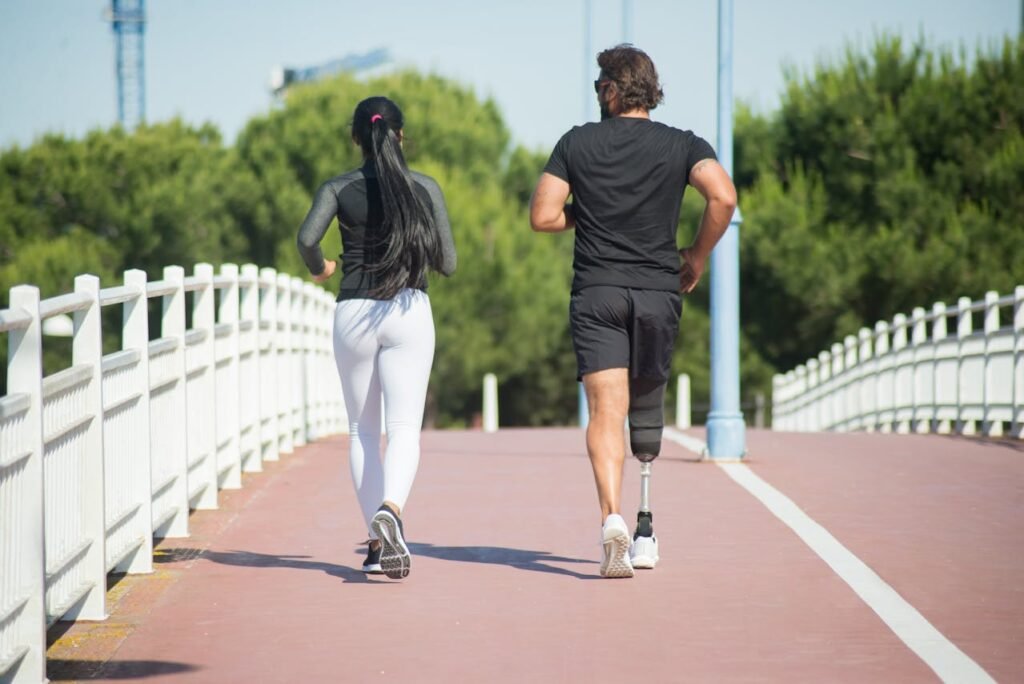For many people in India, losing a limb feels like losing independence. A prosthetic can restore not only movement but also dignity, work, and everyday joy. But there’s one big challenge—cost.
Even though advanced prosthetics like Grippy™ are more affordable than imported ones, they still cost lakhs of rupees. For many families, arranging this money is overwhelming. Insurance can help, but not everyone is covered. Government schemes exist, but approvals can take time.
That’s where CSR funding and NGO support step in. Across India, companies and non-profits sponsor prosthetics for those who cannot afford them. The help is real. The impact is life-changing.
The problem is, most people don’t know where to apply, how to prepare their case, or what documents to submit. They get lost in confusion and miss out on opportunities.
This guide is here to change that.
We’ll explain how CSR funding works, how NGOs support prosthetics, which organisations to approach, and how to make your application stronger. With the right steps, you can reduce or even remove the financial barrier to getting a prosthetic.
Let’s begin.
How CSR Funding Works in India
What CSR Actually Means
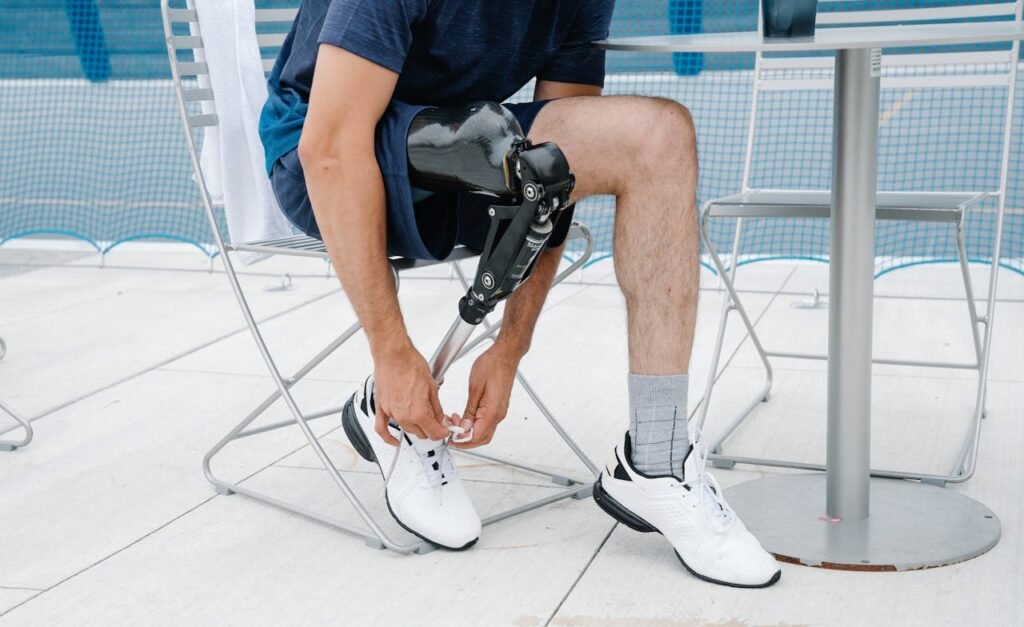
CSR stands for Corporate Social Responsibility. In India, under the Companies Act, certain companies must spend a part of their profits on social good.
This money is not charity—it is a legal requirement. Many companies use CSR funds to support education, healthcare, disability inclusion, and rehabilitation. Prosthetics often fall under healthcare and disability support.
Why Companies Fund Prosthetics
For companies, funding a prosthetic isn’t just about meeting CSR obligations. It’s about changing a life in a visible, impactful way.
When someone receives a prosthetic, they regain the ability to work, live independently, and contribute to society again. This makes it a powerful CSR story—one that companies proudly showcase as part of their impact.
How the Process Works
CSR funding is usually routed through:
- Partner NGOs
- Company foundations
- Direct tie-ups with hospitals or prosthetic providers
For example, a company may donate ₹50 lakh to an NGO that runs a disability program. The NGO then identifies beneficiaries, evaluates their needs, and uses part of the money to provide prosthetics.
This means patients usually cannot apply directly to the company. Instead, they apply through the NGO or hospital connected with that CSR project.
Why NGOs Play a Key Role
The Bridge Between Companies and People
NGOs are often the link between CSR funds and real people. While companies may have the money, NGOs have the networks to find those who need help most.
They organise medical camps, identify amputees, and connect them with prosthetic providers. They also handle paperwork, background checks, and fund distribution.
NGOs That Focus on Prosthetics and Disability
Some NGOs work specifically with amputees and differently-abled people. Others have broader healthcare programs but still include prosthetic support.
These organisations either fully sponsor prosthetics or provide partial funding based on the case.
At Robobionics, we regularly collaborate with such NGOs. Together, we’ve helped patients receive Grippy™ hands or mechanical devices at little to no personal cost.
Why You Should Approach NGOs First
While companies have funds, they often don’t deal with individuals directly. NGOs, on the other hand, are approachable. They hold camps, accept applications, and process requests on behalf of beneficiaries.
That’s why applying through the right NGO increases your chances of getting support.
How to Apply for CSR or NGO Funding
Step 1: Identify the Right Organisation
The first step is knowing who to approach. Not every company or NGO funds prosthetics. Some focus on education, others on environment. You need those that work in healthcare, disability, or rehabilitation.
Search for NGOs in your city that organise prosthetic camps. Look at CSR arms of large companies known for healthcare projects. Hospitals empanelled under corporate CSR often have lists of ongoing programs.
At Robobionics, we maintain partnerships with several NGOs and foundations, and we guide patients toward the right ones based on their needs.
Step 2: Gather Your Medical Proof
No funding will be approved without medical documentation. Keep these ready:
- Doctor’s prescription for a prosthetic
- Hospital discharge summary (if related to an accident or amputation)
- Disability certificate, if you have one
- Photographs of the affected limb (many NGOs ask for these for verification)
These documents prove your medical need is genuine and urgent.
Step 3: Write a Personal Application
Beyond documents, your personal story matters. NGOs and CSR programs want to know who you are, what you do, and how the prosthetic will change your life.
Write a simple, heartfelt letter covering:
- Your background (age, job, family situation)
- Cause of amputation (accident, illness, etc.)
- Current challenges in daily life
- Why you need a prosthetic and how it will help you return to work or independence
Keep it real, not exaggerated. Authentic stories move decision-makers faster than polished ones.
Step 4: Submit Through the Right Channel
If it’s an NGO, submit your application at their office or through their camp coordinators. If it’s a company foundation, check their website for application links. Some accept online forms, others need referrals from hospitals.
Always keep copies of everything you submit.
Step 5: Follow Up Politely
After applying, wait a week or two and then follow up. Ask if your file is being reviewed. Be polite but persistent. NGOs often deal with hundreds of applications, so staying visible helps.
How to Make Your Application Stronger
Be Specific About Your Needs
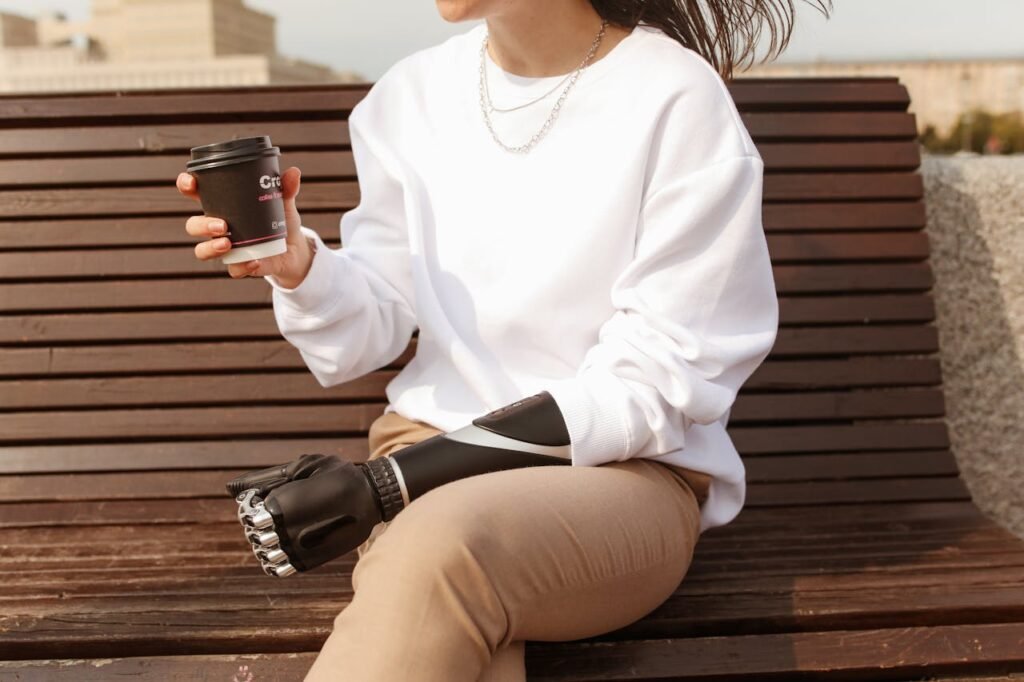
Don’t just say, “I need a prosthetic.” Instead, specify the type—“I need a below-elbow bionic hand to return to my work as a tailor.”
Specificity shows that you’ve thought through your need, and it connects directly to your livelihood.
Show That It Will Change Your Life
Explain how the prosthetic will help you earn again, support your family, or reduce dependency. Funders like to see long-term impact, not short-term relief.
For example, a college student might say: “With this prosthetic, I can type and complete my studies, which will help me secure a job.”
Be Honest About Your Financial Situation
If you cannot afford the device, state that clearly. If you can contribute partially, mention it. Many NGOs prefer co-funding, where they cover part of the cost while the family pays a small share.
Use Support Letters
Letters from doctors, employers, or community leaders add credibility. A doctor can confirm your medical need, while an employer can state that you will return to work once fitted.
These small additions can make your file stand out.
NGOs That Support Prosthetics in India
Bhagwan Mahaveer Viklang Sahayata Samiti (BMVSS)
BMVSS is famous for its Jaipur Foot program. It provides free prosthetic limbs, calipers, and other mobility aids to thousands of people across India and abroad.
They organise camps in rural and urban areas, making prosthetics accessible to those who cannot afford them. Their focus is mostly on mechanical limbs, but the scale of their work is unmatched.
Ratna Nidhi Charitable Trust
Based in Mumbai, this NGO runs disability projects, including prosthetic and orthotic support. They partner with donors and corporates to distribute artificial limbs and mobility aids free of cost.
They are known for their outreach camps, where hundreds of amputees receive assistance in a single event.
Narayan Seva Sansthan
This organisation provides free medical services, including prosthetic support, to underprivileged people. They also focus on rehabilitation, training, and vocational programs for people with disabilities, ensuring they can reintegrate into society.
Rotary and Lions Clubs
Local chapters of Rotary and Lions Clubs often fund prosthetic distribution drives. While not dedicated NGOs, they mobilise funds through members and CSR tie-ups to support amputees.
At Robobionics, we have partnered with such clubs in multiple cities to deliver Grippy™ hands at subsidised or fully sponsored costs.
CSR Foundations That Fund Prosthetics
Tata Trusts
The Tata group has a long history of funding healthcare initiatives. Their CSR arms often collaborate with NGOs and hospitals to support prosthetics, rehabilitation, and disability inclusion.
Reliance Foundation
Reliance runs several healthcare programs under CSR, including support for physically challenged individuals. They occasionally fund prosthetic devices through hospitals and NGOs.
Infosys Foundation
Infosys supports projects in healthcare and education. In the past, they have funded assistive devices and rehabilitation programs for differently-abled individuals.
Mahindra Rise Initiatives
Mahindra Group is known for supporting inclusive projects. Their CSR sometimes covers prosthetic devices, especially for children and rural beneficiaries.
Regional Corporate Programs
Apart from large names, many regional companies—steel plants, textile mills, and IT firms—direct part of their CSR toward prosthetic camps in nearby districts. These opportunities often don’t make headlines but can be accessed through local NGOs.
Real Stories of Beneficiaries
Story 1: Rekha’s New Beginning
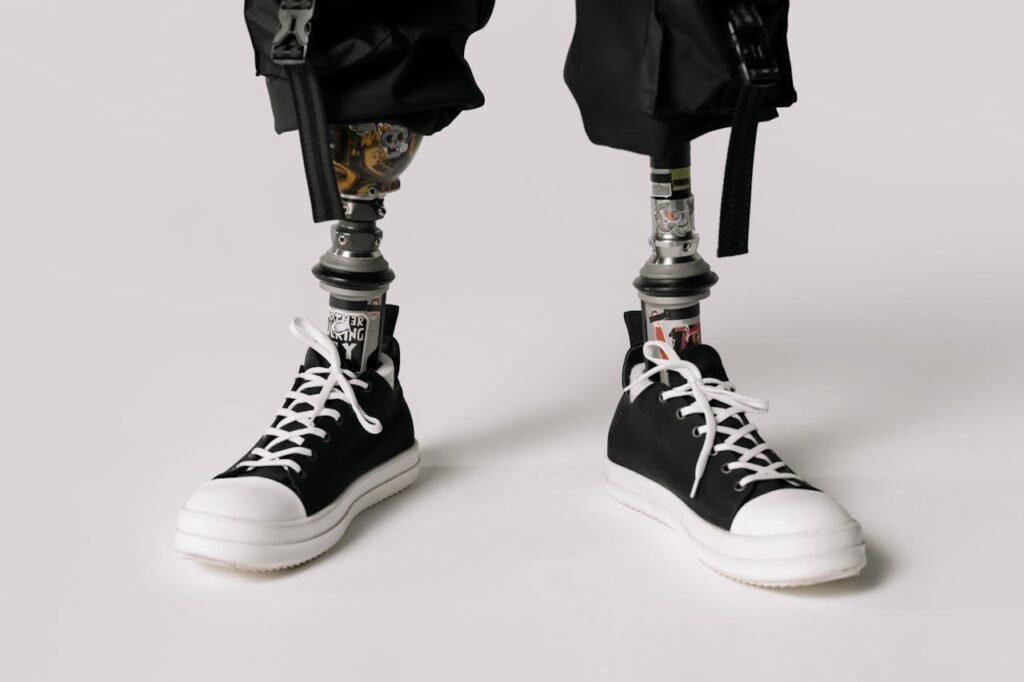
Rekha, a 28-year-old from Uttar Pradesh, lost her leg in a road accident. Her family could not afford a prosthetic. Through a camp organised by BMVSS, she received a Jaipur Foot free of cost.
Within months, she was able to walk again and return to her small tailoring business. Her story became an example in her community of how NGO support can restore independence.
Story 2: Sanjay’s Return to Work
Sanjay, a 36-year-old security guard in Mumbai, lost his arm in an industrial mishap. His employer’s insurance did not cover prosthetics.
With the help of Ratna Nidhi Trust and partial CSR funding from a corporate donor, he received a mechanical prosthetic hand. Within weeks, he was back at work, earning for his family again.
Story 3: Meera’s Grippy™ Hand
Meera, a 22-year-old student from Jaipur, dreamed of finishing her computer science degree. After losing her right hand in a train accident, she thought her studies were over.
Through a partnership between Robobionics, Lions Club, and a CSR donor, she received a Grippy™ bionic hand. With its tactile feedback and functionality, she resumed typing and coding. Today, she is pursuing her career in IT.
Her journey shows how CSR + NGO + prosthetic innovation can open doors for a brighter future.
How to Find CSR and NGO Opportunities
Watch Out for Camps
Most large NGOs and CSR programs conduct prosthetic camps in different cities and towns. These are usually advertised through local newspapers, community centres, or hospitals.
Keep an eye out for announcements from organisations like Rotary, Lions Clubs, or disability welfare offices. Attending these camps often gives you a direct chance to register for free or subsidised prosthetics.
Connect With Hospitals and Clinics
Hospitals and prosthetic providers are often the first to know about CSR funding opportunities. When corporates tie up with NGOs, they usually route beneficiaries through medical institutions.
At Robobionics, we regularly share information about upcoming CSR projects with our patients. This way, they don’t miss out on opportunities.
Use Word of Mouth
Many beneficiaries learn about CSR help from others in their community. Talk to people who already received prosthetics through NGOs. Ask them which organisations helped and how they applied.
These personal connections can guide you better than websites or advertisements.
Avoiding Scams and False Promises
Red Flags to Look Out For
Unfortunately, not every program is genuine. Some fraudsters promise free prosthetics in exchange for money or personal documents.
If someone asks for large upfront payments or makes vague promises without official paperwork, be cautious.
Verify the Organisation
Always check if the NGO or CSR program has an official website, registered address, or track record. Genuine programs are transparent about their work and usually publish reports of past projects.
Trust Empanelled Hospitals and Providers
If an NGO or CSR program is routed through a known hospital or a certified provider like Robobionics, it’s far more reliable. Such tie-ups usually have official approvals and clear processes.
How to Maximise Your Chances of Approval
Present a Strong Case
CSR funds are limited. NGOs often get more requests than they can fulfil. To increase your chances, make sure your application tells your story clearly.
Be honest about your financial situation. Explain how a prosthetic will help you return to work, study, or daily independence. Link it to your livelihood whenever possible.
Provide Complete Documentation
Missing papers delay or block approvals. Before applying, make sure you have:
- Doctor’s prescription
- Disability certificate (if applicable)
- Proof of income (salary slip, ration card, or self-declaration)
- ID proof and photographs
The more organised your file is, the easier it is for NGOs to process your request.
Be Open to Co-Funding
Sometimes NGOs can’t cover the full cost but are willing to part-fund. If you’re open to contributing even a small amount—or combining their support with EMI—you increase your approval odds.
Stay in Touch
After applying, follow up politely. Show that you are serious and willing to provide more information if required. Persistence often helps move your file forward.
Common Mistakes People Make
Waiting for Free Help Without Exploring Options
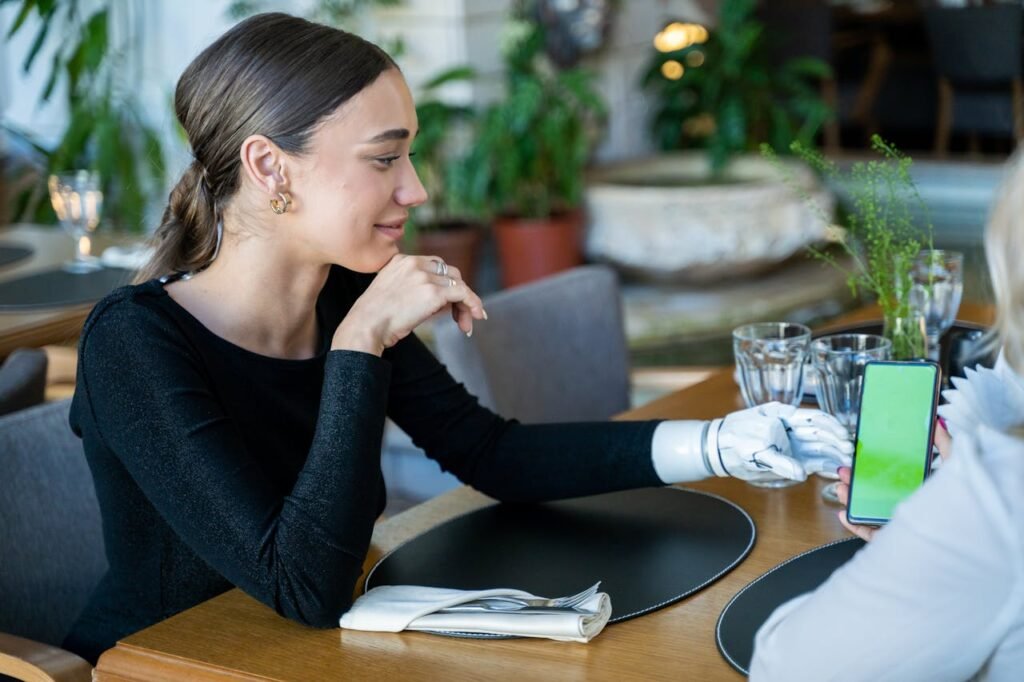
Many people wait for years, hoping a free camp or NGO will reach their town. In the process, they lose valuable time and remain dependent. It’s better to actively apply to NGOs, explore CSR tie-ups, and combine partial support with EMI if needed.
Submitting Incomplete Applications
Applications often fail because documents are missing. A missing prescription, unclear photos, or lack of proof of income can slow down or block approval. Always prepare a full file before submitting.
Not Following Up
NGOs handle hundreds of requests. If you apply and then sit quietly, your case may get buried. Following up politely shows commitment and keeps your file moving.
Assuming CSR and NGOs Cover Everything
In reality, many programs provide partial support. Families who expect 100% funding are often disappointed. It’s smarter to be open to co-funding, EMI, or government subsidies alongside CSR.
How Businesses Can Strategically Use CSR for Prosthetic Support
Make Impact Measurable
One of the reasons CSR projects in healthcare succeed is because the impact is visible and measurable. Unlike some social initiatives where outcomes are long-term, prosthetics deliver immediate transformation.
When a company funds a prosthetic, the beneficiary often goes from being dependent to being independent almost instantly. For businesses, this creates a powerful story of change. But to make it truly measurable, companies should:
- Track the number of beneficiaries reached.
- Document before-and-after scenarios (with consent).
- Measure rehabilitation outcomes such as return to work, education, or community participation.
This not only justifies CSR spending but also builds credibility for future initiatives.
Build Long-Term Partnerships, Not One-Time Donations
Many CSR projects focus on short-term distribution camps. While useful, these events often lack follow-up. A prosthetic is not a one-time product—it requires fittings, adjustments, and sometimes replacement parts.
Companies can create deeper impact by partnering long-term with prosthetic providers like Robobionics and NGOs. Such partnerships ensure:
- Continuous care for beneficiaries.
- Better data collection on long-term outcomes.
- Stronger visibility for the company’s brand across multiple years.
Instead of scattering funds across many small projects, businesses should aim to build signature programs that define their identity in healthcare CSR.
Align Prosthetic Funding With Employee Engagement
CSR is not just about money—it’s also about connecting employees to a cause. Companies can involve their staff by:
- Hosting awareness drives about disability and inclusion.
- Organising volunteer days at prosthetic camps.
- Offering payroll donation matching for employees who want to contribute.
This makes CSR feel less like compliance and more like a movement inside the company. Employees who witness someone walking again with a prosthetic are far more motivated than those reading about abstract CSR reports.
Leverage Technology for Scale
Many NGOs and prosthetic providers still rely on manual application processes. Businesses can add value by supporting tech-driven solutions.
Examples include:
- Online beneficiary registration portals.
- Digital tracking of applications and approvals.
- Tele-rehabilitation platforms that guide beneficiaries remotely.
By funding technology infrastructure, companies help NGOs scale faster and reach more people across rural areas. This creates multiplier effects beyond just prosthetic distribution.
Focus on Inclusive Narratives
For CSR programs, storytelling is as important as funding. Businesses should highlight not just the act of giving prosthetics but the human journeys behind them.
For instance, instead of stating “100 prosthetics donated,” a company can share stories of beneficiaries returning to their jobs, completing education, or supporting families again. These narratives humanise CSR, build stronger public goodwill, and inspire more stakeholders to get involved.
Create Hybrid Models: CSR + EMI + NGO
One of the most innovative approaches businesses can take is to co-fund prosthetics. Instead of fully sponsoring or limiting coverage, companies can structure models like:
- CSR funds cover 50% of the cost.
- NGO subsidy adds another 20%.
- The beneficiary contributes the rest via EMI.
This spreads impact across more people while ensuring beneficiaries also feel ownership. It also reduces program costs for companies while multiplying the number of lives transformed.
Frequently Asked Questions
Can I apply directly to a company for CSR help?
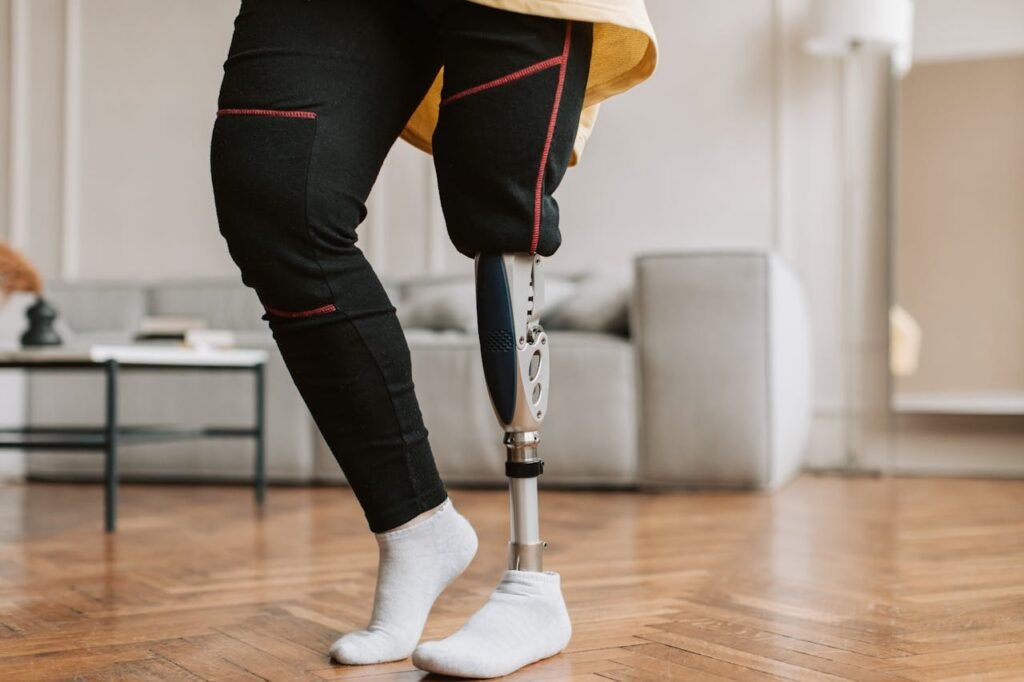
Usually not. Companies route their CSR funds through NGOs, hospitals, or foundations. Applying through these channels is more effective.
Will NGOs cover advanced prosthetics like Grippy™?
Some do, especially when partnered with corporate donors. Many NGOs cover basic devices, but through CSR tie-ups, advanced bionic hands can also be funded partially or fully.
Do I need a disability certificate?
It’s not always mandatory, but having one strengthens your case. It proves official recognition of your condition.
How long does it take to get approval?
It varies. Some camps provide prosthetics immediately. Formal CSR applications may take weeks or months, depending on fund availability and verification.
Final Thoughts: Funding Is Possible If You Know Where to Look
The cost of prosthetics can feel like a mountain. But with CSR and NGO funding, that mountain becomes climbable. Across India, thousands of people have already received free or subsidised limbs through these programs.
The key is knowing where to apply, preparing your documents properly, and staying persistent. Combine NGO help with CSR support, and add EMI if needed—you’ll find that the dream of walking, holding, and working again is closer than you think.
At Robobionics, we don’t just build prosthetics—we help people access them. We work with NGOs, CSR partners, and patients to ensure funding never stands in the way of independence.
Your Next Step
If you or someone you know needs a prosthetic but worries about cost, let us guide you.
When you book a free demo with Robobionics, you get more than a device trial. You get:
- Guidance on CSR and NGO funding opportunities
- Support in preparing documents and applications
- Information about EMI plans to combine with funding
- Access to our network of partners who sponsor prosthetics
Visit https://www.robobionics.in/bookdemo/ and take the first step toward getting the help you deserve.
Because cost should never decide whether you walk, work, or live with confidence again.



